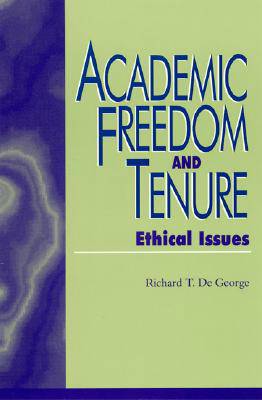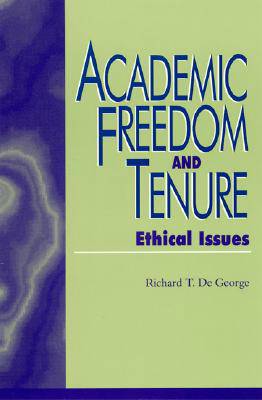
Door een staking bij bpost kan je online bestelling op dit moment iets langer onderweg zijn dan voorzien. Dringend iets nodig? Onze winkels ontvangen jou met open armen!
- Afhalen na 1 uur in een winkel met voorraad
- Gratis thuislevering in België vanaf € 30
- Ruim aanbod met 7 miljoen producten
Door een staking bij bpost kan je online bestelling op dit moment iets langer onderweg zijn dan voorzien. Dringend iets nodig? Onze winkels ontvangen jou met open armen!
- Afhalen na 1 uur in een winkel met voorraad
- Gratis thuislevering in België vanaf € 30
- Ruim aanbod met 7 miljoen producten
Zoeken
Omschrijving
Academic freedom and tenure, both cherished institutions of higher education, are currently under attack by many both outside and within the academy. Richard DeGeorge argues that they can be defended on ethical grounds only if they are joined with appropriate accountability, publicly articulated and defended standards, and conscientious enforcement of these standards by academic institutions and the members of the academic community. He discusses the ethical justification of tenure and academic freedom, as well as ethical issues in their implementation. He argues that academic freedom, which is the basis for tenure, is not license nor the same as freedom of speech. Properly understood and practiced, both academic freedom and tenure exist not to benefit faculty members or their institutions, but to benefit an open society in which they thrive and of which they are an important part.
Specificaties
Betrokkenen
- Auteur(s):
- Uitgeverij:
Inhoud
- Aantal bladzijden:
- 300
- Taal:
- Engels
- Reeks:
Eigenschappen
- Productcode (EAN):
- 9780847683314
- Verschijningsdatum:
- 12/06/1997
- Uitvoering:
- Hardcover
- Formaat:
- Genaaid
- Afmetingen:
- 151 mm x 234 mm
- Gewicht:
- 498 g

Alleen bij Standaard Boekhandel
+ 354 punten op je klantenkaart van Standaard Boekhandel
Beoordelingen
We publiceren alleen reviews die voldoen aan de voorwaarden voor reviews. Bekijk onze voorwaarden voor reviews.











